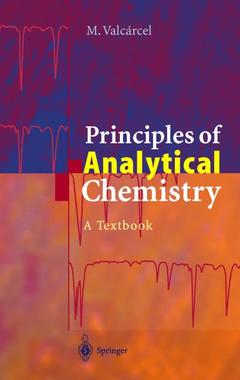Principles of Analytical Chemistry, Softcover reprint of the original 1st ed. 2000 A Textbook
Auteur : Valcarcel Miguel

Innovative approach to teaching Analytical Chemistry to undergraduates
Contains 100 specific examples, 450 questions for students, and 27 seminars
Includes supplementary material: sn.pub/extras
Date de parution : 08-2014
Ouvrage de 372 p.
15.5x23.5 cm
Disponible chez l'éditeur (délai d'approvisionnement : 15 jours).
Prix indicatif 52,74 €
Ajouter au panierDate de parution : 08-2000
Ouvrage de 372 p.
15.5x23.5 cm



